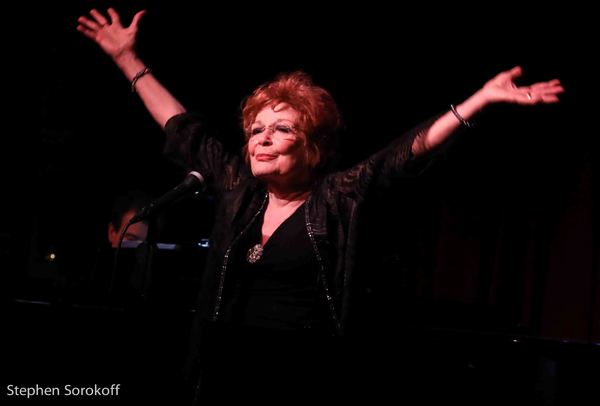By Martha Wade Steketee
It feels as if Anita Gillette has been part of our lives forever. On Broadway and Off-Broadway stages, and on television and movie screens, we’ve seen her play the funny sister or the off-beat cousin or the distracted mom or the deliciously goofy mistress since the late 1950s. In recent years she has added cabaret as another outlet for her many talents. And on Monday night, she, her marvelous band (Paul Greenwood on piano, Ritt Henn on bass, Dan Gross on drums) and a few special guests (David L. Harrison on trombone and Penny Fuller in charming vocal duet) gathered at Birdland to combine their talents in a show directed by Barry Kleinbort to honor songwriter Irving Berlin.
Gillette’s mastery of comedic timing and dramatic power has been on display for over six decades, in shows ranging from Broadway’s original 1959 Gypsy (as a replacement) and Neil Simon’s 1977 Chapter Two; Off Broadway’s John Guare 1976 work Body Parts at the Public and Dan LeFranc’s 2012 The Big Meal; and on screen as the delectable mistress Mona in 1987’s Moonstruck.
In her newest cabaret act, Gillette gave us hints of all her performance colors through the lens of the work of her friend Irving Berlin, the prolific American composer and lyricist born at the end of the nineteenth century and who died at the end of the twentieth. In “Me and Mr. B.” Gillette shared onstage and backstage stories of the friendship that began when she was cast in what turned out to be Berlin’s final Broadway show Mr. President (1962).
The friendship that begin in 1962 between 60-something Berlin and 20-something Gillette sweetly frames her stories that punctuate a broad selection from Berlin’s delicious and deep songbook. He liked to fish, we learn, and engaged in a long-time feud with Groucho Marx. And some of the biggest laughs come from Gillette’s imitation of Berlin’s secretary, assistant protector Hilda, “the Berlin wall.”
Gillette took her solo and group spins with Berlin standards introduced by Garland, Astaire, Merman, and many others. “No Strings” (written for the 1935 film Top Hat) – delivered in a sexy whisper – medley-ed with “I Got the Sun in the Morning” from Annie Get Your Gun (1946) to kick off the festivities. Later in the set, she dug into a marvelous and too-little performed song about love that surprises older independent characters, “They Say That Falling in Love Is Wonderful,” that was a moving highlight of the evening.
Penny Fuller joined her “Sin Twister” performance parter for “Pack Up Your Sings (And Go To The Devil)” from The Music Box Revue of 1922, and they brought down the house with their charming chemistry and harmonizing. “Pack up your sins and go to the devil,” the lyrics instruct, “And you’ll never have to go to bed at all.”
Gillette called David L. Harris and his trombone on stage to accompany her on a dangerous journey for this Garland fan – a performance of one of Berlin’s song “orphans” cut from the final print of Easter Parade (1948), as performed by Judy Garland as vaudeville character Hannah Brown, in the suit-jacket-as dress with fedora outfit that would later be used for “Get Happy” in Garland’s final M-G-M musical Summer Stock (1950). Garland’s performance of the bluesy, sexy “Mr. Monotony” was cut from the initial release but in DVD releases of Easter Parade (as an extra) and in one of the That’s Entertainment movies, extended footage of the excised scene survives and the tune lives on. While Garland at her peak is untoppable. Gillette and the perfectly cast trombonist Harris gave this tune a rousing treatment that earned enthusiastic applause. “Playing on his slide trombone / In a certain monotone / He was known as Mister Monotony. / Any pleasant interlude /That would mean a change of mood/ Didn’t go with Mister Monotony.” Slow, rich, sensual, evocative – who knew a trombone could accomplish that? Berlin did, Garland did, Gillette does, and so does David L. Harris.
“Alexander’s Ragtime Band,” Berlin’s first huge hit from 1911, received a contemplative introduction – yes this tune and it’s “come on and hear” can too be sexy – and provided a history lesson. As Gillette noted after completing the tune, “He lived long enough to see that song go into the public domain.” Imagine that.
Another set highlight featured a Berlin tune from the year Gillette was born, introduced by Astaire in a thrilling, noiry, nighttime dance in a stage show within the film Follow the Fleet (1936). “Let’s Face the Music and Dance” swayed through a minor key this evening, matching its heritage. Written at the height of the Great Depression, the song acknowledges the present and leans into hope and the future.
An impromptu group sing along with Gillette to Berlin’s “God Bless America” rounded out the evening’s offerings, and inspired us all, to a person, to “face the music and dance.”
Photos: Stephen Sorokoff
Anita Gillette Celebrates Irving Berlin: “Me & Mr. B”, was March 26 at 7pm (315 West 44th Street). https://www.birdlandjazz.com/attraction/anita+gillette/





















